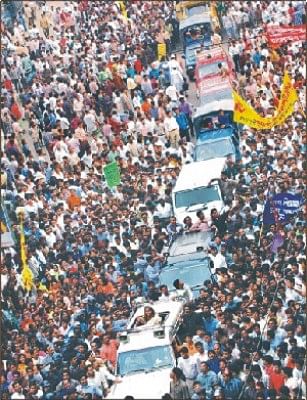Is politics delivering?

Star file photo
AS the global economy recovers, our business community is beginning to see a glimmer of hope. Under the circumstances, the last thing Bangladesh can afford is another wave of crippling national strikes, aimed at toppling the government, putting the country back on the verge of perpetual political chaos. Neither of the major parties can speak from a moral high ground about anti-government strikes or hartals. Both them, when they were in opposition, perpetually stormed out of Parliament and launched ceaseless strikes to destabilise the duly-elected government.
Now the tables are turned, and the BNP is trying to use the same kind of unscrupulous tactics to muddy the political waters. Most of the electorate are not educated, and they hardly understand what the BNP stands for and what the Awami League stands for. They simply believe that ideologies don't separate them, but desire for power does.
Even at the best of times, governing Bangladesh is one of the toughest political challenges on earth. The country is often plagued by devastating floods and cyclones and riddled with poverty and endemic corruption, while its politics still largely remain confined to inflammatory speeches and rapturous applause. It appears that the BNP is out of sync with the mainstream public opinion -- or are they misreading the popular sentiment? It may be that country has changed less and people are less naive than they think.
After nearly 40 years as an independent nation, the answers to Bangladesh's deepest problems seem as far away as ever. During both the BNP and the Awami League governments' terms of office, they made the same vague promises about development but spent the rest of the time scheming to win the next election and form the next government, by any means. Ironically, they don't want to realise that in a democracy people will always have the last word and it is difficult to pull the wool over the electorate's eyes all the time.
Perhaps in Bangladesh words speak louder than actions. If you tell a lie big enough and often enough, after a while people will come to believe it -- but our politicians do not know that the public has a right to expect truthful answers from their leaders. Unfortunately, the last thing we can learn from our politicians is the truth. Today, whether it is government, business or civil society, none has any faith in the other. All of us go by conspiracy theories. We are all blaming somebody else for our mistakes. Why don't we wake up and start blaming ourselves?
Too many countries have been ruined by leaders for whom a government is the accumulation of personal power and dispensation of favour.
What we need is a national change in consciousness. This country has always been the home of progressive politics and we should not allow a few religious zealots to tarnish its traditional progressive image. The government should try to reconcile the vast social inequalities in our society. Politics should involve more patriotism, sense of service to society and greater concern for equality. Politics should catch up with the aspirations and dreams of the people -- people who are starting to raise their expectations.
Wealth and poverty have always coexisted, uneasily, in Bangladesh. Its affluent, self-satisfied elites have never shown much concern for the plight of the poor and homeless. In the past, when the gap between the rich and the poor grew too wide, a revolt would come along to jolt the nation into reality. Nowadays, nobody expects history to repeat itself.
We need to build modern intelligence, police and emergency elite forces to meet the growing threat of home-grown terrorism and to secure our citizens from extremists and religious fanatics. These hostile forces seek to undermine the security and stability of our nation.
Our literacy rate lags far behind that of our neighbours'. Without universal education we will not be able to find enough skilled workers to sustain our thriving overseas job markets and maintain the inflow of remittances at the present high level. What kind of leadership does the nation need to lift itself out of the trap of low growth and high unemployment? It will be a leadership that is determined to root out corruption and ensure good governance, the rule of law and congenial political climate that welcomes foreign and domestic investments.

 For all latest news, follow The Daily Star's Google News channel.
For all latest news, follow The Daily Star's Google News channel. 



Comments